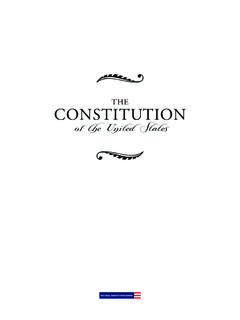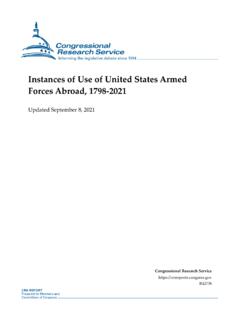Transcription of Simplified United States Constitution and Bill of Rights
1 Minnesota Center for Community Legal EducationB-1 Rights OF THE ACCUSEDSIMPLIFIED United States CONSTITUION AND bill OF RIGHTSS implified United States Constitution and bill of Rights "We the People of the United States , in orderto form a more perfect union, establish justice,insure domestic tranquility, provide for thecommon defense, promote the general welfare,and secure the blessings of liberty to ourselvesand our posterity, do ordain and establish thisConstitution for the United States ofAmerica." Constitution gives the power ofmaking laws to shall consist of two houses, aSenate and a House of House of Representatives:Term of members: two yearsA member must be at least twenty-fiveyears old, seven years a citizen of the , andwhen elected, an inhabitant of the state in which heor she was elected. Representation and directtaxes are decided according to the number ofpeople living in each state.
2 Originally persons notfree (meaning black slaves) counted as three-fifthsof a free persons for those purposes, but since the14th Amendment this is no longer the more than one representative forevery thirty thousand people. The House shallchoose its Speaker and other SenateTerm of senators: six years (one out ofevery three senators completes his or her termevery two years.)A senator must be thirty years of age, nineyears a citizen of the , and an inhabitant of thestate in which he or she was Vice president of the is president of theSenate, but only votes when there is a or Rights of CongressMembers cannot be arrested whenattending sessions or going to or returning cannot be questioned in any other placefor any speech or debate in either bills must start in the House. Thenthey have to be approved by the a bill passes both Houses it goes tothe president for approval.
3 If signed by thePresident, it becomes law. If the president doesnot want to sign it, the bill should be returned toCongress, which can pass it over the president 'sveto by a two-thirds vote in both Houses. If thebill is not returned to Congress in 10 days, itbecomes law without the president 's if Congress has already adjourned and thePresident fails to return it, it is not a law (pocketveto).Powers of CongressTo lay and collect taxesTo pay the debtsTo provide for the common defense and general welfare of the borrow moneyTo regulate commerce with foreign nationsand among the statesTo establish uniform rules of naturalization (making people not born in American citizens)To coin moneyTo set up lower federal courtsTo declare warMinnesota Center for Community Legal EducationB-2 Rights OF THE ACCUSEDSIMPLIFIED United States CONSTITUION AND bill OF RIGHTSTo raise and support an army and a navyTo provide for calling out the state militia to carry out the laws of the , put down rebellion and repel invasionsTo govern an area not to exceed ten miles square to become the Capital of the (This became Washington, )
4 , and to govern forts, arsenals, dockyards, and other "needful buildings"To admit new States into the UnionTo make rules and regulations for the terri- tories of the "To make all laws which shall be necessary and proper for carrying into execution the foregoing powers." Constitution gives the executivepower to the of the president is four by an electoral college. Theperson having the greatest number of votes to bePresident: second highest, Vice president . In caseno one has a majority of the electoral votes, thenthe House of Representatives shall pick a Presidentfrom the top five. The House shall vote by statesand a majority is neededto elect. The 12th Amendment (1804) providedthat the electors state who their choice was forPresident and who it was for Vice president must be "a natural born citizen"or a citizen of the at the time of the adoptionof the Constitution .
5 A president must also be atleast thirty-five years old anda resident within the for fourteen years. Incase the president is removed from office, is unableto carry out the duties of the office, or dies, theVice president shall act as president . Beforeentering office the president is re-quired to take anoath to "preserve, protect, and defend the Consti-tution of the United States ."Powers of the PresidentThe president is commander-in-chief of the army and navy and of the state militia whencalled into the service of the president may pardon persons punished for offenses against the president can make treaties, but two- thirds of the Senators must agree to president appoints public officials, am- bassadors, Supreme Court judges, etc., with the advice and consent of the president can call both Houses together on very special president is to carry out the laws of the :The president and all other civil officialscan be removed from office on impeachment for,and conviction of "treason, bribery, or other highcrimes and misdemeanors.
6 " The house of Repre-sentatives presents the charges against an official,who is tried in the Senate. In an impeachment trialof the president , the Chief Justice presides overthe Senate and a two-thirds vote is needed Constitution gives "judicial power,"the power for judging, to a Supreme Court andlower of the judges: They shall hold office"during good behavior" - that is to say, they cannotbe dismissed unless they do courts can hear suits betweenstates, between a state and a citizen of anotherstate, between citizens of different States , andbetween a state or citizen and a foreign state or aforeign citizen. They can also try cases arisingfrom matters on the high seas (admiralty).Minnesota Center for Community Legal EducationB-3 Rights OF THE ACCUSEDSIMPLIFIED United States CONSTITUION AND bill OF RIGHTSThe bill of Rights (or First Ten Amendments) (1791) is forbidden to pass any lawsetting up a religion or interfering with religiousfreedom or with free speech or with the right ofpeople to get together peacefully and petition thegovernment to have their grievances looked right of the people to keep and beararms shall not be interfered solider in time of peace shall beassigned to live in a private home without theconsent of the owner, nor in time of war except ina lawful people are protected against searchand seizure without a grand jury is provided for in seriouscrimes.
7 Persons are protected from being triedtwice for the same offense, or from having totestify in criminal cases against themselves, or frombeing deprived of life, liberty, or property withoutlawful fair and speedy trial for the accused isguaranteed in criminal jury trial is provided for in civil suitsexceeding $ high bail, stiff fines, or cruel punish-ment are crimes, except impeachment of office-holders, shall be tried by jury. Treason against shall consist of making war or joining theenemies of the or "giving them aid andcomfort." No person shall be convicted of treasonunless two witnesses saw that person commit theact, or unless he or she confesses in Constitution forbids the statesTo make a treaty or alliance with a foreign countryTo issue paper moneyTo keep contracts from being carried outTo grant titles of nobility (Congress also is not allowed to do this)To levy taxes on imports or exportsTo keep troops or ships of war in times of peaceTo go to war without the consent of change or amend the Constitution twoways are provided.
8 A)Congress by a two-thirds votecan propose an amendmentb)A Convention can be called bytwo-thirds of the States to propose amendmentsIn either case, three-fourths of the statelegislatures must approve the change before itbecomes a part of the Constitution , the laws of the , andTreaties shall be "the supreme law of the land,"binding on every judge in every shall be required to belong to aparticular religion in order to hold an office in Amendments(Dates tell when the amendments became part of the Constitu-tion.)Minnesota Center for Community Legal EducationB-4 Rights OF THE ACCUSEDSIMPLIFIED United States CONSTITUION AND bill OF because certain Rights of the peoplehave been stated in the Constitution does notmean that they do not have still others not men-tioned powers not given by the Constitutionto the nor forbidden to the States are re-served to the States or to the the citizens of another state or ofa foreign country from suing a state in the (1798).
9 That the electors should state ontheir ballots the person they want for Presidentand the person for Vice president (1804). slavery and "involuntary servitude"(1865). States from passing laws deprivingany person of life, liberty, or property "withoutdue process of law" or of not giving to eachperson the equal protection of the law (1868). the or any state from pre-venting a person from voting because of "race,color, or previous condition of servitude" (1870). the income tax (1913). for the election of Senators bythe people instead of by the state legislatures(1913). the manufacture, sale, or shipmentof intoxicating liquors (the Prohibition Amend-ment) (1919). women the right to vote (1920). term of the president ends onJanuary 20. If the president elect dies before theterm begins, the Vice president elect shall becomePresident (1933). the 18th Amendment; once moreallows the making and sale of liquor (1933).
10 Any president from serving more thantwo terms. Where a Vice president has becomePresident on the death of the president and hasserved more than two years of the president 'sterm, the Vice president shall not be allowed torun for more than one term in addition (1951). the District of Columbia threeelectoral votes for the election of president andVice president (1961). the United Statesor any state to abridge or deny any citizens theright to vote for the president or Vice president orfor any state representative in Congress becauseof failure to pay a poll or any other Congress the powerto enforce this article by appropriate legislation(1964). up a plan for the Vice president totake over the duties of the president when thelatter is unable to perform them (1967). voting by eighteen-year-olds(1971).



